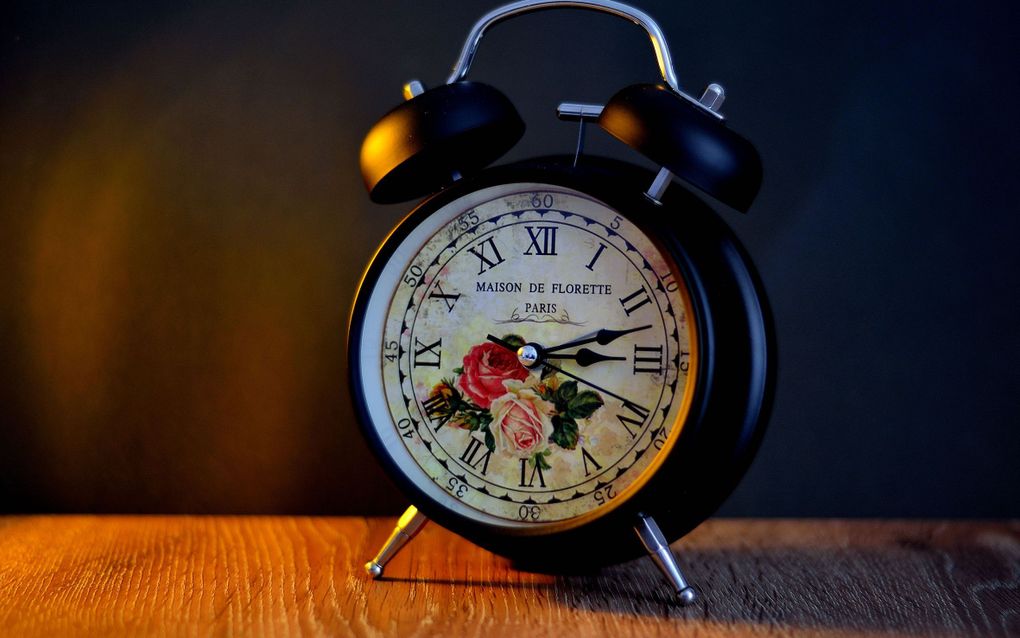If the Father had left us after winding up the clock, there would be no love

Deism presented God as the one who just wound the clock. Not as the Fatherly Creator. Photo Flickr, Süleyman Cesur
Opinion
The sixties promised freedom and happiness. But today, Marguerite Peeters only sees chaos and fear. Since God is no longer seen as Father, no one has a choice anymore: every person has to invent himself. “Poor young people are the victims of evil lobby groups.”
Marguerite Peeter’s Curriculum Vitae consists of nine pages full of scientific activities. Only in a few lines at the end, it tells who she really is: “Care-giver of her elderly parents until death.” This aligns with what she propagates at conferences: love between people, which stems from the love between the three Persons in God.
She speaks respectfully about her father, Prof. Paul L. Peeters. He taught history of political ideas in New York. Marguerite was born there.
Later, the family returned to Belgium, where her parents originated from. For years, she could enjoy horseback riding at her parents’ house in the countryside, but that was over after her mother’s death in 2018.

Her father already described in a book in 1979 how the Soviet Union would fall. “He saw that the Eastern Bloc would not be able to keep up the race. Ten years later, it did happen indeed.”
In 2007, you predicted in your book “The globalization of the Western cultural revolution” that the results of the 1960s would collapse like the Berlin Wall. But up to now, this “postmodern radicalism” is still flourishing.
“Not completely. In the sixties, the atmosphere was optimistic, with free love and so on. But today, there is a lot of pessimism. I have a report from Unesco that is full of the dangers against which young people have to arm themselves. In everyday life, I see the bitter fruits of the cultural revolution everywhere. People live alongside each other; families are broken; young people do not feel loved; the use of drugs increases. If you look at the happiness we were promised fifty years ago, all we see is ruins.”
In Africa, Peeters saw a sense of community. There she learned what love could mean for a country. “Love has a political meaning there. In China, too, friendship is a social virtue. Why shouldn’t that be possible for us in the West?”
Love disappeared from the West
According to her, love disappeared from Western society. She thinks she knows how. It happened during the Age of Enlightenment in the eighteenth century. Deism presented God as an ‘unmoved mover’; a Creator who wound the clock but who no longer cared for His creation.
“That way, God was no longer a Father of humankind. His love, however, was also gone. One could no longer expect care and compassion from Him. If my Creator is not interested in me, I do not need to be interested in others either. We do not have the same Father, so we are not brothers and sisters. I am just my own creator.”
That last notion is what Peeters sees today in the gender discussion. “As long as I know that my Creator loves me, I can receive my manhood or womanhood from Him. If I can no longer do so, I have to re-create myself; from an emptiness. This is how we raise children nowadays. The minor has its own opinion and rights. It chooses its own goals; the adult is only there to guide the child. Authority is inappropriate, because who are you as an individual that you would want to punish the other individual?”
The emptiness leads to a complete reversal of values, Peeters believes. “In the feminist revolution, women stood up for themselves by rejecting motherhood and fighting for the right to abortion. Men and women turned against marriage as the basis for family life. Then the room was made for alternative relationship forms, such as homosexuality. All this is directed against what we have received from our Creator.”
Homosexuals say they have received their own specific identity.
Peeters hesitates for a moment. “I want to be careful with that subject. I realise that some people are attracted to people of the same sex. I know little about the medical or psychological side of the matter. As a Christian, I know that God made man and woman, for each other. Evil lobby groups worldwide are trying to destroy this image of God in us. Poor young people are their first victims.”
You speak of attacks on the traditional family. How can family life be attractive today?
“Oh, don’t worry; strong families remain attractive. Let parents and children love each other. Let father and mother exercise their parenthood according to the example of God’s fatherhood. He mixes His authority with love and compassion. And yes, He punishes, but He does not abuse. When the world sees such families, it becomes envious.”
Postmodern language
Every revolution brings a new language, says Marguerite Peeters. So does postmodernism.
Love becomes equal to free sex. “That was the great promise of the sixties. Now it is different. Sex is risky because you can get sick or pregnant.”
Dignified dying becomes death on demand. “You choose your own dignity. The quality of life is as you experience it. In death, there is no dependence on God as Creator.”
Other words disappear. Eternity becomes durability. Husband becomes partner. Conscience becomes consent. “Conscience defines good and evil. Instead, we now speak of choice and consent.”
Words can create things; Peeters refers to the philosopher Judith Butler. “Through language, I could say that I am a man. That is, of course, very confusing. Because language then becomes detached from reality. I am in fact a woman.”
When it comes to man and woman in society, what would your ideal be?
Peeters thinks for a moment. “As a Catholic, I would say: man should be focused on one another, just like the three Persons in God. People are brothers and sisters of each other because they are sons and daughters of the Creator.
God calls men to work and to manage creation as a steward, as Genesis says. Furthermore, the man begets life and bears his authority in love.
Unfortunately, women often have a bad image of themselves. That has destroyed a lot. Feminism is a threat to unborn life. Unfortunately, the woman was also the first to fall into sin in Paradise. My ideal is that the woman cares, nurtures and teaches.”
Communion
The Roman Catholic Peeters lives in the Brussels suburb of Sint-Lambrechts-Woluwe. In her free hours, the French-speaking publicist is often found in the park across the street for a stroll, she tells via Skype. “In the area, there are also several churches that I like to visit.”
She would prefer to go to Communion every day, she says. But because of corona, that is not possible. “I go as much as possible. I have known since my childhood that no one but God can fill my heart fully. For that reason, I don’t experience it as a loss that I am not married and don’t have a family.”
Until the end of the Cold War, she was not aware that postmodernism brought a “worldwide cultural revolution”. “After the fall of the Berlin Wall, I lived for a year and a half as a journalist in Ukraine. At first, I saw sincere hope there. People were walking in the streets, chanting and waving flags. After fifty years of oppression, the Ukrainians wanted to continue as a Christian nation. They hoped that the West would bring democracy and religious freedom.
After a few months, that hope was gone. Crime and mafia brought disappointment. And before Christians came from the West, Planned Parenthood was already there to share its vision of women’s rights.”
New threat to humanity
After returning from Ukraine, Peeters started working as a journalist in Brussels. In preparation for the United Nations International Population Conference in Cairo, she spoke with someone from the Vatican who was going there: Christine Vollmer. “She showed me that after Communism, there was a new threat to humanity. This time, it came from the West. Interest groups and lobbies began to use the UN for their global agenda. These were unelected people who bypassed democratic institutions, yet their plan was rolled out globally.”
Peeters immediately felt a “calling” to delve deeper into this. “Numerous important conferences followed the Cold War. Therefore, I followed the UN for years.”
Since then, she has been engrossed in these subjects. In her book “The Globalization of the Western Cultural Revolution”, among others, she explains the consequences of this new threat, as she sees it. “In Africa, where family and relatives are important, the United Nations came and explained that pregnancy is a ‘risk’ and that women have ‘reproductive rights’. The latter sounds nice but simply amounts to the right to abortion. That is an attack on the sanctity of life and respect for marriage.
When you see how quickly the West has changed, you can’t help but wonder what will happen to Africa. However, I know that Africa needs development in terms of population growth. But as a Catholic, I see this in a completely different way. Start with education, for example, so that girls get married at a higher age.”
Who is Marguerite Peeters
Marguerite A. Peeters was born in 1963 in the US as the youngest of four children. She has two nationalities: American and Belgian. Her father was a professor of political science at Iona College in Fordham, New York. She studied art history, theology, philosophy and journalism at the Sorbonne in Paris, among other places.
She specialised in the United Nations and analysed the human image and world view that guides international organisations. The results of her research are documented in the books “The Globalisation of the Western Cultural Revolution”, “Hijacking Democracy: the Power Shift to the Unelected”, and “The Gender Revolution: a Global Agenda”. Many books have appeared in several languages, including at least French.
She conducts her activities at the Institute for Intercultural Dialogue Dynamics in Brussels.
Some UN conferences were about more technical matters, such as housing in Istanbul and food in Rome, both in 1996. How ideological were they?
“Very ideological. I interviewed many people there. That is how I discovered that a new form of decision-making was introduced. It is no longer the national governments that call the shots but global interest groups. As soon as there is a consensus, everyone has to comply. There is no majority voting; everything goes by consensus. Countries that don’t want to participate are put under pressure.
If interest groups put forward a strange proposal, don’t countries shoot it down?
“No, a small country is no match for a big organisation like Amnesty International. They support all new freedoms, including abortion and gay marriage. Even a Christian NGO (non-governmental organisation, EvV) will not be able to stop them.
Moreover, national MPs are also strongly oriented towards the international consensus. Amnesty is supposed to stand for the good. I have the feeling that democracy is no longer nurtured from below but controlled from above. These international NGOs are taking power away from the people.
Consensus is elusive. That is part of postmodernism. The time of truth is over; we live in the so-called “post-truth era”. If you ask an expert about climate change, he does not present you the facts but says what the consensus among scientists is.”
Peeters calls this new administrative model “global governance”. “It is a network of international partners with shared goals. Decision-takers are not politically accountable. Democracy is, in fact, being hijacked.”

How do you experience the corona pandemic?
Smiling: “Around corona, we see more than ever governance by experts. The pandemic is being approached as purely a technical problem unrelated to humans. Who would dare contradict the experts?
But experts can also be ideologists with a hidden agenda. You really have to question and challenge those people.”
A Dutch version of this article was published previously in Reformatorisch Dagblad on March 29th 2021.
Related Articles







